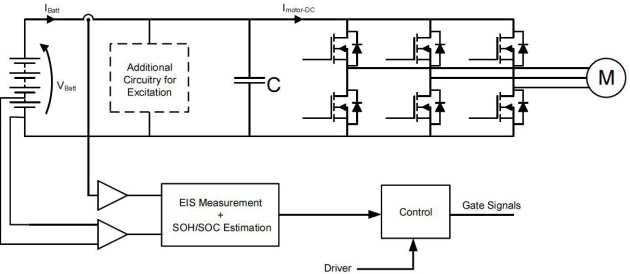On-line State of Charge (SOC) Measurement & Battery Management for Electric Vehicles

The aims and objectives of this research project is to facilitate the transition period of being able to utilise lithium-iron phosphate battery as a major energy source to substitute over conventional forms of energy used for daily transportation vehicles. Even though the state of charge (SOC) for lithium-iron phosphate battery could be measured and determined currently by using the Electrochemical Impedance Spectroscopy (EIS) technique, nevertheless this is constrained to be done in the laboratory with bulky and expensive equipment. Not to mention the scale of the amount of batteries being measured is still limited and is not applicable for on-line measuring. Since it is already known that the EIS technique could be employed to measure battery state of charge, therefore in order to generate the required signals to compute impedance on-line (hence state of charge), the control algorithms employed for electric vehicles power train should be investigated and mastered in order to carry out all sorts of experiments regarding the measure of impedance on-line.
As the current trend of the majority motors employed inside both hybrid or pure electric vehicles are Asynchronous induction motors (ACIM) or Permanent magnet synchronous motors (PMSM), therefore the control algorithm-Field Oriented Control is being investigated.
Field-Oriented Control or commonly known as Vector Control is a control algorithm proposed in the 1970s and later realized in beginning of 1990s, the core of the proposal is to decouple the torque and the magnetizing flux components so that one can achieve DC-performance like for AC motors along with the economic advantages AC motors possess. The ultimate research goal is to be able to carry out on-line state of charge measurement without the least hardware upgrades but software.

The aims for the current research work are to:
- Compute the core of a model-based power train of an electric vehicle utilising an induction motor model in Simulink,
- Investigate the possibility of different modulation schemes via Field-Oriented Control to generate required signals for on-line impedance measurement,
- Investigate possible motor attributes subject to impedance measurements such as torque variation, speed variation, overall system efficiency, etc.
- Investigate the most suitable modulation scheme for battery impedance measurement on-line,
- Implement Field-Oriented Control practically based on the simulation results, and compare the outcomes against simulation results.
CAP People
- Kuan-Wen Chen email: k.chen13@imperial.ac.uk
- P. Mitcheson email: paul.mitcheson@imperial.ac.uk
- N. Brandon email: n.brandon@imperial.ac.uk
- V. Yufit email: v.yufit@imperial.ac.uk


